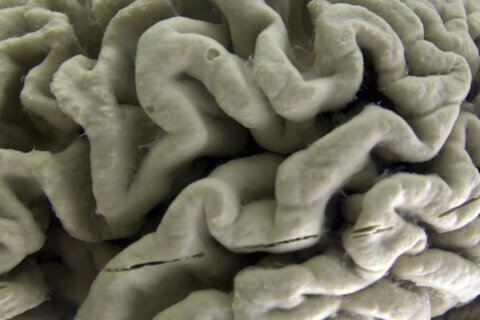Memory can wither with age. While forgetfulness can be a scary experience, there are ways to fight memory loss and improve memory.
[IMAGE]
“Memory lapses can be both embarrassing and troubling, but the good news is it is never too late to improve your powers of recall,” says Dr. David Poulad, a neurosurgeon at IGEA Brain and Spine in Union, New Jersey. “Your brain continues to develop neurons and build new connections to strengthen memory as you age. There are plenty of strategies that help you improve your memory today and keep it robust for years to come.”
Below, experts provide various tips for how to improve your memory, avoid memory loss and prevent further damage if loss has occurred.
[READ: Eating for Your Brain as a Senior.]
Age-Related Forgetfulness vs. Dementia
Age can take a toll on the body. While noticeable physical changes may take the form of graying hair and weaker knees, age can impact brain function too. As you grow older, your brain may be less adept in some cognitive abilities, such as memory.
But while it’s also normal to become increasingly forgetful with age, severe memory problems are not normal and could be signs of Alzheimer’s or dementia.
If you notice that your — or a loved one’s — memory problems are consistent, severe and forcing you to alter your way of living to cope, this is concerning, says Dr. Vernon Williams, a board-certified neurologist, pain management specialist and founding director of the Center for Sports Neurology and Pain Medicine at Cedars-Sinai Kerlan-Jobe Institute in Los Angeles.
This kind of memory loss is one of the first sign of Alzheimer’s disease or other dementias, diseases which are among the “age-related memory disorders that can have a debilitating effect on a person’s quality of life and unfortunately, can also shorten that life,” Williams adds.
According to the National Institute on Aging, signs of dementia can include “the loss of cognitive functioning — thinking, remembering, learning and reasoning — and behavioral abilities to the extent that it interferes with a person’s quality of life and activities.”
To most effectively differentiate between age-related forgetfulness and dementia, schedule a doctor’s appointment to address your symptoms. Before your appointment, you can ask yourself a few questions on your own time too.
1. How often are you forgetting things? If you’re occasionally forgetful, this may not be a big deal. If you are forgetting things to an extend where it impacts your day-to-day life, this is more concerning.
2. Are you fully unable to recall a memory, or is it taking you a longer time to dig it back up? Total forgetfulness can be more concerning than needing a longer time to recall a memory.
3. What types of things are you forgetting? According to the Centers for Disease Control and Prevention, if you experience memory losses like struggling to navigate “your familiar route to the grocery store or having trouble recalling very recent events,” you may be dealing with something more serious than age.
4. In addition to forgetfulness, are you experiencing changes in your language skills, visual perception, attention span or personality? According to NIA, people with dementia can experience a combination of these symptoms.
While these experiences can be scary, the good news is that if you’re noticing signs of memory loss, there are ways to strengthen your memory and fight against further decline.
“We don’t have to accept devastating memory problems as a fact of life as we get older,” Williams says. “There is plenty we can do right now to help maintain our memory function and enhance it.”
[READ: Which Doctor Should I See for Dementia and Cognitive Decline?]
Short-Term Versus Long-Term Memory Loss
Memory loss can impact your short-term memory, long-term memory or both. Your short-term memory is your ability to remember something recent, whereas your long-term memory is your ability to recall something that happened a long time ago, such as from when you were growing up. With diseases like dementia, short-term memory tends to be impacted first.
Hayley B. Kristinsson, a neuropsychologist at UCI Health and an assistant clinical professor of health sciences at UCI School of Medicine, explains that long-term memories are more equipped to resist memory loss due to how the brain processes and stores memories. This process consists of three stages:
1. Encoding. This first step of the memory storage process is essential for forming a memory at all.
2. Storage. This second step of the memory storage process is essential for holding onto that memory.
3. Retrieval. This is the last stage of the process, which refers to the ability to retrieve — or remember — stored memories.
Recent information goes through this process first to create a short-term memory. Then, over time and paired with emotion — as emotional events such as a death or a wedding tend to stick with us for longer — it can become a long-term memory.
Kristinsson explains that people with Alzheimer’s disease often have problems with memory storage, making it hard for them to hold onto and retrieve newer memories. But even as the brain struggles to form new short-term memories, it may still remember those already stored long-term memories, which were likely created when the person was younger and healthier than they are now.
“We often think of long-term memories, such as those from childhood, as being fairly resistant to the effects of neurodegeneration until late in the disease process,” Kristinsson says. “Short-term memory is typically what is impacted and can be very difficult to improve because of the underlying neuropathology causing the short-term memory loss. If something is not consolidated into short-term memory, then it will not become a long-term memory.”
Unfortunately for people with Alzheimer’s disease and dementia, long-term memories can also be impacted in later stages of the disease, she adds.
[READ: 6 Strategies for Aging Successfully.]
9 Tips to Improve Memory
For many people, memory improvement is possible. The extent to which memory can improve, however, will look different from person to person. For instance, a short-term memory that was never properly encoded is unlikely to return to your mind. Future memories may have better chances. Individualizing expectations and talking to a doctor about the severity of your memory loss challenges can help you set a frame of reference for what you want to achieve.
“We often think about preventing or slowing further decline rather than recovery of memory function,” Kristinsson says. “Compensatory strategies are often employed in order to help the individual cope with their short-term memory difficulties.”
Compensatory strategies are techniques that can help you work with and around memory issues — and set you up for success in recalling future memories.
Strategies to boost memory include:
1. Repeating things.
2. Making reminders.
3. Using your senses.
4. Using visual cues.
5. Setting consistent routines.
6. Timing activities strategically.
7. Minimizing distractions.
8. Writing down your personal experiences.
9. Avoiding multitasking.
1. Repeating things
Repeat things back to yourself, or write it down.
2. Making reminders
Put a sticky note on your fridge or calendar, or set reminders on your phone. These can be helpful to keep track of tasks and items on your to-do lists. Make a list of tasks that may have become more challenging to remember on a daily basis, such as taking medications or other daily activities.
3. Using your senses
Kristinsson recommends using mnemonics or multimodal processing to contextualize things you want to remember. Mnemonic devices — like acronyms and rhymes — work by tapping into how the brain naturally stores data. For example, she says to give words to visual things you want to remember (people, nature) and attach images to words. To ensure long-term retention, rehearse new information after several minutes, several hours, the next day, then every few days.
“Use verbal cues to remember visual information and use visualization when learning verbal information,” Kristinsson says. For example, f you have a new co-worker named Jack and an uncle with the same name, you could imagine your co-worker with glasses and a beard — just like your uncle Jack — to help you remember your co-worker’s name.
4. Using visual cues
Visual cues like brightly colored rubber bands or bracelets can be helpful ways to keep track of tasks you’ve completed or have yet to get done, Kristinsson says.
5. Setting consistent routines
Setting a consistent daily routine can reinforce patterns and may help with short-term memory loss.
Kristinsson suggests creating a routine that includes waking at the same time each morning. Also find time for enjoyable activities on top of personal care and household responsibilities.
6. Timing activities strategically
How you order your daily tasks can impact your ability to remember them and get them done smoothly.
Kristinsson explains that “difficult or cognitively taxing activities should be completed at the beginning of the day when fatigue is low and attention is at an optimal level, as impaired attention can impact encoding of new material causing short-term memory difficulties. Large projects should be broken down into smaller tasks and take frequent breaks when engaged in a long task.”
7. Minimizing distractions
A clean living and working environment with minimal distractions may help you focus on your tasks and remember what you need to do.
8. Writing down your personal experiences
The best way to remember personal experiences is to write about them. Memory research has established that when people write about their personal experiences, they tend to recall those occurrences much better.
9. Avoiding multitasking
Doing multiple things at once could adversely affect your short-term memory, particularly as you get older. One study found that people between the ages of 60 and 80 have significantly more trouble remembering tasks after they’ve experienced a brief interruption than do people in their 30s and 40s. Research has shown that switching your attention from a laptop to a cellphone or texting while watching TV decreases the gray matter in our brains that helps us with sensory perceptions, including decision-making and memory.
[READ: Foods for Better Sleep.]
7 Lifestyle Changes for Memory Improvement
Many facets of health can impact memory, including diet, exercise, sleep, social engagement, co-occurring conditions and age. Taking care of your body as a whole may help prevent physical and mental deterioration as you age — including fighting against memory loss. This is particularly true with cardiovascular health, as “what is good for the heart is good for the brain,” Kristinsson says.
Ways to support brain health include:
1. Eating a healthy diet.
2. Exercising regularly.
3. Staying social.
4. Staying cognitively active.
5. Sleeping well.
6. Seeking treatment for physical and mental health conditions.
7. Avoiding excessive alcohol consumption.
1. Eating a healthy diet
A healthy diet can support brain health. Research finds that along with other benefits, foods rich in omega-3s, such as some fish and nuts, as well as those full of antioxidants, can help protect the brain from memory decline. Williams recommends people follow diets similar to the Mediterranean diet, abundant in healthy proteins and fats, for most support. The MIND diet, which is similar to the Mediterranean diet, was designed to support brain health and memory loss.
“Brain volume loss can affect learning and memory, especially as we get older, but the components of the Mediterranean diet are shown to have protective benefits for the brain,” Williams says.
2. Exercising regularly
“Making daily physical activity a priority optimizes blood flow to the entire body, brain included,” Williams says. “Adequate blood and oxygen supply to the brain helps keep our memories sharp.”
For example, a study in the British Journal of Sports Medicine found that people ages 50 and older experienced boosts to brain health following exercise sessions lasting 45 minutes to an hour at a minimum of moderate intensity.
“To get the most brain-boosting bang for your buck, aim for a minimum of 30 minutes of heart-pumping cardiovascular exercise most days a week,” Williams suggests. “Of course, be sure to clear any new activity with your doctor before you begin.”
If cleared, he encourages options like:
— Running.
— Power walking.
— Swimming.
— Cycling.
3. Staying social
Socializing with others can support brain health and memory.
“We are innately social beings, and social neuroscience has shown us that social engagement can impact brain health,” Kristinsson says. “Social engagement can foster a sense of closeness and connectedness with others and decrease isolation and loneliness.”
4. Staying cognitively active with memory improvement games
Engaging your brain in cognitive activities like problem-solving and skill-learning can help with memory. Cognitive exercises like brain games and learning new skills can enhance your cognitive function and may work against memory decline. Pushing ourselves out of our comfort zones and learning something new and challenging stimulates the brain, which helps our mental sharpness, agility and memory.
While these exercises can be helpful, they are not a foolproof prevention for memory loss or from diseases like Alzheimer’s and dementia — so don’t use them to replace any medical advice.
“Cognitive exercise is important for maintaining good cognitive functioning throughout the lifespan,” Kristinsson says. “Although research is mixed regarding the effectiveness of brain games in actually preventing dementia, cognitive exercises can be employed to learn compensatory strategies for coping with memory loss.”
Such exercises can include:
— Learning a new skill, like a musical instrument or a new language.
— Reading a book.
— Playing a crossword puzzle.
— Taking dance lessons.
— Practice yoga.
“The important thing is to find something that challenges you to think in new ways while also providing enjoyment,” Kristinsson says. “Activities that are cognitively stimulating are fun, engaging, challenging and novel.”
5. Sleeping well
Keeping a consistent and adequate sleep schedule supports brain health too. As we get older, lack of sleep can impair our memory. Memory lapses are more common when we are sleep deprived or have had several nights of poor sleep quality. Aim for 7 to 9 hours of sleep each night.
“One of the most fundamental ways to keep your brain functioning correctly and sharp is to turn it off,” Williams says. “Powering down on a nightly basis allows the brain to heal and restore itself, clearing toxins that can lead to Alzheimer’s disease and other dementia types.”
6. Seeking treatment for physical and mental health conditions
Staying up to date on medical appointments, treating existing conditions and seeking out medical attention for new symptoms is important in caring for your brain.
7. Avoiding excessive alcohol consumption
Alcohol disrupts the brain’s ability to form memories — and drinking too much can have unfortunate effects on brain health and memory storage and retrieval.
When to Consider a Memory Care Facility
If your loved one is experiencing more severe memory loss, especially if you feel their condition is putting themselves or others at danger, it may be time to consider a memory care facility. This is a big decision to make, so you’ll want to meet with a health care provider to go over a few questions to help determine if your loved one is ready for the change and, if so, what memory care facility is best for them.
More from U.S. News
The Best Gift Ideas for Nursing Home Residents
Assisted Living Communities: Types of Rooms
Recognizing the Signs and Symptoms of Dementia
How to Improve Memory: Expert Tips for Seniors originally appeared on usnews.com







